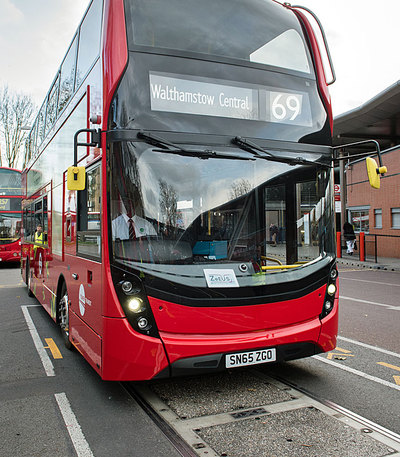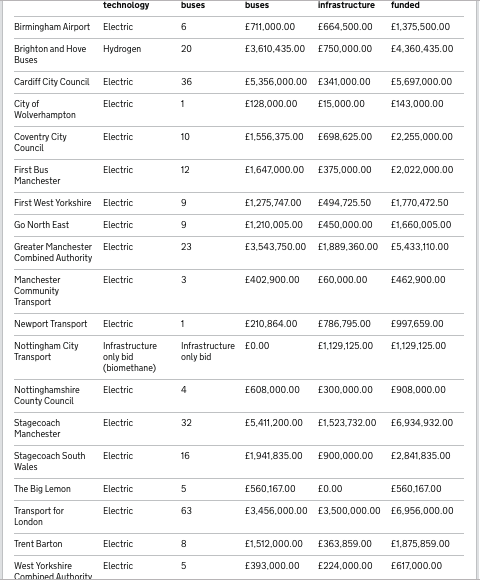 Councils and bus companies in England and Wales have been given £48m to pay for low carbon buses and infrastructure.
Councils and bus companies in England and Wales have been given £48m to pay for low carbon buses and infrastructure.
Most are electric, though Brighton and Hove Buses has been awarded £4.4m for 20 hydrogen buses and associated infrastructure. Nottingham City Transport has been awarded £1.13m to pay for biomethane infrastructure.
The funding will be welcomed by clean air campaigners and those calling for efforts to reduce emissions from transport to concentrate on communal means of travel, such as buses, trains and taxis – both in terms of improving low carbon infrastructure, and the fundamental services, to reduce the overall number of private vehicles on the road.
It follows the announcement of a further £6m to help councils pay for electric taxis and charging infrastructure, plus £14m for hydrogen fuel cell vehicles and associated infrastructure.
 Grants for electric buses and infrastructure took the lion’s share of the money. In most cases, the money for the buses outweighed grants for charging infrastructure. However, just over half of TfL’s £6.96m grant to put 63 new electric buses on the road is for the infrastructure itself.
Grants for electric buses and infrastructure took the lion’s share of the money. In most cases, the money for the buses outweighed grants for charging infrastructure. However, just over half of TfL’s £6.96m grant to put 63 new electric buses on the road is for the infrastructure itself.
Meanwhile Newport Transport has been awarded almost £1m to put just one electric bus on the road – with the infrastructure grant accounting for £787k of the total awarded funding.
While some transport firms may install additional infrastructure to help ensure optimal charging and range, such as onsite generation and storage, as well as novel charging methodologies, those in city centres may find paying for the necessary grid upgrades adds significant cost.
According to some industry commentators, it is possible that some transport operators seeking to electrify their entire fleet may find it cheaper to move depots to where there is capacity, rather than bring capacity to their sites.
See the winners here.
Is your organisation considering switching to EVs or installing charging infrastructure for public or private use? If so, please take The Energyst’s 4 minute survey to help inform a new, free EV report.
Related stories:
EVs, smart charging, vehicle-to-grid: Your views needed
Large firms commit to massive EV push
Volkswagen: Carmaker to become energy company
Nissan: 2019 a ‘breakthrough year’ for cars as power plants, eyes energy supply market
BT and Eon pledge to electrify fleet by 2030
Sir Terry Leahy on EVs, infrastructure and pitching to the board
Chargepoint raises £189m to fund EV charging infrastructure
Nissan: Vehicle to grid services will not drain EV batteries
Total partners with Chargepoint to bundle energy and EVs to businesses
Bring forward zero carbon transport target, MPs urge
Octopus backs flex and EVs for growth
Nissan and Eaton rollout commercial scale battery
Pivot Power makes huge play for 2GW battery storage and EV charging network
You only live twice: Battery storage from second hand EV powerpacks
‘Land grab’ for EV car parks and revenue
Energy managers ‘to become fleet managers as EVs rise’
Electric vehicle boom no sweat, says National Grid
Electric vehicles ‘won’t require new power stations’, say analysts
Northern Powergrid: EVs a resource not a problem
EVs ‘could provide 11GW of flex’
National Grid focuses on bringing smaller firms and EVs into flexibility
Carmakers become aggregators as DNOs fear overnight EV boom
Tesla: People don’t engage with energy bills, but they will have to
Lord Redesdale: Idea of EVs as battery storage is “complete crap”
Follow us at @EnergystMedia. For regular bulletins, sign up for the free newsletter.




Interesting to see both Brighton operators supported, with BH&D getting hydrogen and the Big Lemon getting electric. Given the reported past bad blood between the two companies, I doubt that there will be opportunities for side by side comparisons, but it could be interesting.
How did you get to the £44mn figure?
I have clicked through to the data here https://www.gov.uk/government/uploads/system/uploads/attachment_data/file/774207/ultra-low-emission-bus-scheme-winning-bidders.csv/preview
and it looks like it should be £48mn.
Thanks
Matt
You’re right. It’s £48m for low carbon vehicles. £5.53m of that is for hydrogen/biogas, so headline amended to £42m for electrics (rounded down), text corrected. Thanks Matt.